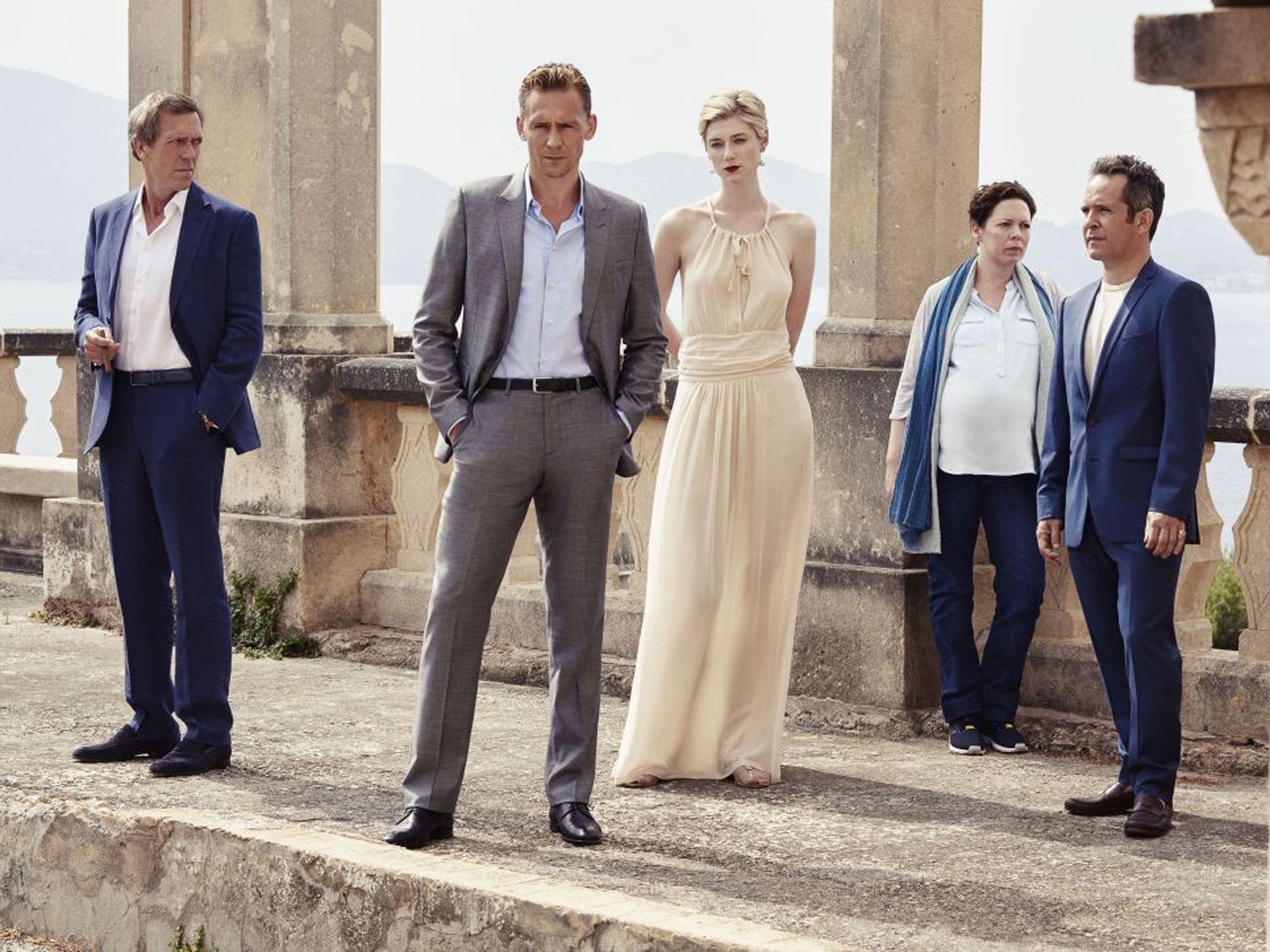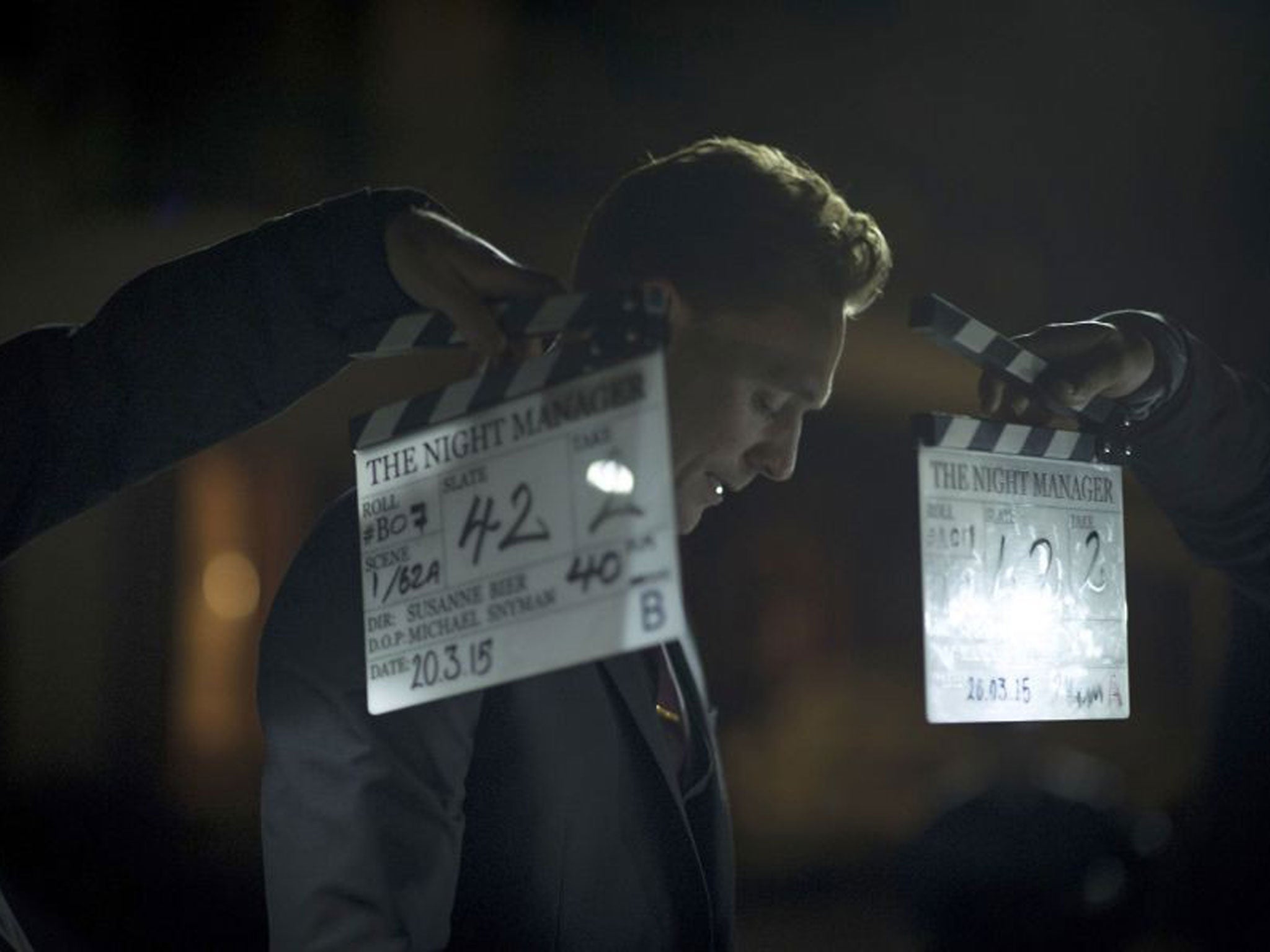Hugh Laurie shines in BBC's adaptation of John le Carré's The Night Manager
The BBC's lavish new John le Carré thriller 'The Night Manager' features Tom Hiddleston doing his best Bond and Olivia Colman as a 21st-century Smiley. But it's Hugh Laurie's villain – his first British television role in 13 years – who really stands out. Gerard Gilbert meets the cast and director

If Tom Hiddleston wanted to audition as a more sensitive, 21st-century incarnation of James Bond – the type of 007 who might look slightly pained at having to kill and who might fetch his Bond girls a cup of tea in bed – then he couldn't do much better than sending producer Barbara Broccoli a link to the BBC's splendid new John le Carré adaptation, The Night Manager, in which he plays the titular hero.
But the charming and debonair Hiddleston would perhaps slip rather too neatly into the role; what is far more surprising about The Night Manager is Hiddleston's fellow Etonian Hugh Laurie's chilling turn as "the worst man in the world" (as one of his victims describes him), arms dealer Richard Roper.
We knew Laurie could do grumpy – he did little else for the eight years between 2004 and 2012 when he played the misanthropic diagnostic genius Dr Gregory House – but this menacing turn is a revelation for an actor who once played Bertie Wooster to a tee.
"To describe someone as 'the worst man in the world', what do we really mean?" says Laurie. "Are we talking about intention because there might be lots of people out there who mean harm but are incapable of executing it... they are incompetent villains. What is so frightening about Roper is his competence, his intelligence and his malice and cruelty."
Laurie's first British television role in 13 years (his last appearance was in the 2003 series of Fortysomething) is so frightening because it is so plausible. He is utterly ruthless but charming and funny with it. "I don't think there's any harm in acknowledging that the devil has good tunes," says the 56-year-old actor. "If the devil had 'devil' tattooed on his forehead we'd all run a mile straight away. And I don't worry about the moral soul of the audience – I just hope they'll enjoy the ambiguity."
"Hugh is a wonderful actor whose depth is maybe under-appreciated here in the UK," says Stephen Cornwell, John le Carré's son, whose company, the Ink Factory, has produced The Night Manager alongside the BBC and AMC (makers of Mad Men and Breaking Bad).
Le Carré's 1993 novel follows British former soldier Jonathan Pine, a night manager in a luxury hotel in Cairo, who becomes involved with the mistress, Sophie, of an Egyptian arms dealer with connections to Richard Roper. Sophie provides Pine with incriminating documents about Roper and asks him to forward them to British intelligence. A short time later Sophie is found murdered, and Pine finds himself going undercover in Roper's organisation.
"It was my father's first post-Cold War novel and it announced his relevance to a new world order," says Cornwell. "Paramount immediately bought the rights for Sydney Pollack to direct from a Robert Towne screenplay, but it couldn't be wrestled into a 90-minute screenplay. And five years ago Hollywood tried again, this time Brad Pitt was going to play the night manager, but it didn't happen. At that point the rights came home." Ironically Laurie had himself attempted to buy the film rights back in 1993. "Within about three chapters of reading it I resolved to try to option the book in the role of producer, which it turns out I'm absolutely pathetic at... I didn't get anywhere with it," he says. "Back then of course I rather arrogantly dreamed of the possibility of playing the character of Jonathan Pine and have to sit back now and watch Tom Hiddleston being virile and charming, which is really galling to watch...
"I think there is a righteous anger about le Carré's writing in this book, which touched me very directly, and 25 years later when the possibility of actually putting this on screen I just fell on it like a starving man."
The hunger shows in a performance that forms the dark heart of The Night Manager. Laurie says he wanted to meet some "real-life Ropers", but was forbidden to do so. "I did identify a couple of people working in this world whom I really wanted to meet and observe as much as I could, but I was advised that not only would this make us legally liable but also it might get worse than legally given the type of world these people operate in," he says. "These are deeply frightening people who you absolutely don't want to get on the wrong side of."
The six-part drama is more than the Hiddleston-Laurie show however, and there's a strong ensemble cast that also includes Tom Hollander as Roper's long-standing associate Corcoran and Olivia Colman as M16 agent called Burr, a character that in the novel was a gruff Yorkshireman.
"Women have been running our secret services for some two decades now," says Cornwell, "and le Carré's books are very British and very male and it seemed important to have a strong female presence. Burr is a kind of Smiley, so essentially Olivia's character has become a 21st-century female version of Smiley."
Colman herself had recently found out that she was pregnant with her third child when she first met with the director, the Oscar-winning Danish film-maker Susanne Bier. "I thought I can't lie because hopefully it will become quite obvious," says Colman. "In a desperate attempt to keep in the running, I said 'Remember Frances McDormand in Fargo." McDormand wore a "pregnancy pillow" filled with birdseed to simulate her character's pregnancy in the Coen brothers film.
"To be absolutely honest I immediately thought Olivia's pregnancy would be a fantastic advantage," says Bier. "Her being the moral heart of the piece it certainly adds to it her being pregnant. The producers all agreed, although the insurance company was a bit concerned."

Bier, who won an Academy Award for her 2010 movie In a Better World, has been wanting work in television for some time. "It's where the best writing is now," she says. "There was a bunch of [scripts] that I received and there was something that said 'John le Carré', so everything else just fell away. Usually in feature films you have two primary characters but here there was this vast gallery of really exciting, interesting characters. I read 10 pages and then actively pursued the producers."
Bier has done a magnificent job, aided by South African cinematographer Michael Snyman. Having changed the novel's original focus on Roper selling arms to Colombian drugs cartels, Laurie's character now supplies his deadly arsenal to opponents of the Arab Spring uprising in Egypt.
Filming took place in Morocco (Marrakech standing in for Cairo), London, the Swiss ski resort of Zermatt and Majorca, where Roper's luxurious villa is located. "Most of my stuff was in Majorca in this rather fancy house they'd rented in the very north of the island", says Tom Hollander.
"Susanne Bier's process is to get everybody there at the beginning of the day and then work out what she's going to do, which could be hellish if you were stuck shooting underneath the A40, but in Majorca in an amazing strange turreted ex-fort with swimming pools and sea all around it on three sides it wasn't a bad place to while away the day."
Corcoran, a waspish gay man, has some of the best lines, but Hollander isn't being facetious when he suggests that his character is misunderstood. "He's the only character capable of real love," says the Rev star. "Pine threatens his relationship with Roper, so in a way there's a broken love story."
I wondered with Laurie whether taking on Roper was part of a conscious decision to play darker roles. "No, I don't think of acting in those categorical terms... 'I could do with something lighter now'..." he says. "There are only two categories that mean something and that's good or bad. It could be good funny, good tragic, but if it's good that's the main thing."
The actor (and, of course, musician; he plays with a jazz quintet and has released a blues album) is now firmly based back in London, where he lives with his wife of more than 25 years, theatre administrator Jo Green and their three grown-up children – after a brief flirtation with relocating the entire family to Los Angeles in 2008, following the strain of being apart for nine of months of the year while filming House. Does this mean that he will be making more British TV?
"It [being British] is not the primary criterion," he says. "One is drawn to a story or a script or the people you might have the opportunity to work with. I mean this is a British production but it's an incredibly international one as well – we had a Danish director, a South African cinematographer, half a Moroccan crew and Spanish sound recordists... it felt as if we were all nations and one at the same time. I love it here... I would love to work here... God, I'm sounding like I come from somewhere else..."
'The Night Manager' begins on Sunday at 9pm on BBC1
Join our commenting forum
Join thought-provoking conversations, follow other Independent readers and see their replies
Comments
Bookmark popover
Removed from bookmarks